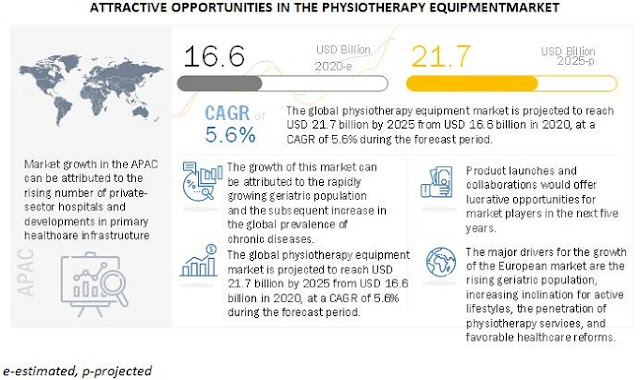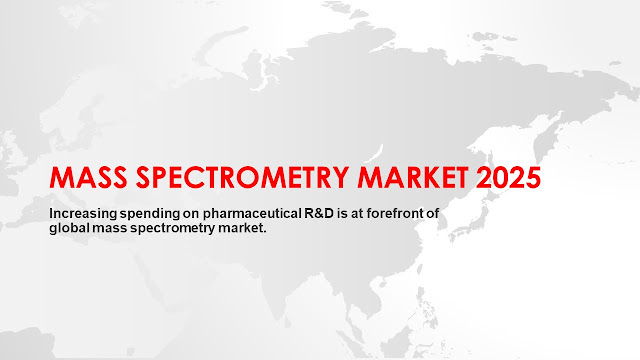Physiotherapy Equipment Market - Emerging Growth Factors, Current and Future Perspectives 2025
The rapidly growing ageing
population and the subsequent increase in the global prevalence of chronic
diseases are the major factors driving the growth of the physiotherapy
equipment market. In addition, the growing incidence of sports injuries, degenerative
joint disorders, and cerebrovascular disease will also contribute to market
growth in the coming years.
Physiotherapy
Equipment Market Dynamics: Impact Analysis
1.
Increase in
The Global Prevalence of Chronic Diseases
2. Growing Incidence of Sports Injuries
3. Emerging Markets
4. Technological Advances
5. Wide Range of Applications
The physiotherapy equipment market is projected to reach USD 21.7 billion by 2025 from USD 16.6
billion in 2020, at a CAGR of 5.6%.
Key Questions Addressed in The Report:
1. Who are the top 10 players operating in the global
Physiotherapy Equipment market?
2. What are the drivers, restraints, opportunities, and challenges in the
Physiotherapy Equipment Industry?
3. What are the opportunities
for stakeholders and provide details of the competitive landscape for key
players?
4. What will be growth of Physiotherapy Equipment in North America, Europe,
Asia Pacific, Latin America, and the Middle East and Africa?
5. What are the Known and Unknown Adjacencies
Impacting the Physiotherapy Equipment Industry?
Download PDF Brochure:
https://www.marketsandmarkets.com/pdfdownloadNew.asp?id=65250228
Growing Demand for Electrotherapy Equipment:
The
electrotherapy equipment segment is projected to grow at the highest CAGR
between 2018 and 2024. Growth in this segment is mainly driven by the
increasing adoption of electric stimulation-based techniques for physiotherapy.
Neuromuscular electrical stimulation (NMES), specifically functional electrical
stimulation (FES) that compensates for voluntary motion, and therapeutic
electrical stimulation (TES) aimed at muscle strengthening and recovery from
paralysis are widely used in clinical settings for rehabilitation, especially
for stroke.
Musculoskeletal Application:
On the basis of application, the market is segmented into
cardiovascular and pulmonary applications, musculoskeletal applications,
neurological applications, pediatric applications, gynecological applications,
and other applications (includes sports and palliative care). In 2018, the
musculoskeletal applications segment accounted for the largest share of the
market, followed by the neurological applications segment. The large share of
the musculoskeletal applications segment is attributed to the rising incidence
of musculoskeletal disorders, growth in the geriatric population, and the
increasing number of accidents.
Request Sample Report:
https://www.marketsandmarkets.com/requestsampleNew.asp?id=65250228
Europe and Asia Pacific to Dominate The Industry:
Europe is the major
revenue-generating regions in the global physiotherapy equipment industry.
Factors such as the rising geriatric population, increasing inclination for
active lifestyles, the penetration of physiotherapy services, and favorable
healthcare reforms are driving the growth of the physiotherapy equipment market
in Europe.
Asia Pacific is expected to show the highest
growth rate during the forecast period. The high growth rate of this region can
mainly be attributed to the rising geriatric population, the growing number of
private sector hospitals, developments in primary healthcare infrastructure,
and the inclination toward active lifestyles.
Key Players:
The leading players in this market include DJO
Global (US), BTL Industries Inc. (US), Performance Health (US), ITO Co., Ltd.
(Japan), Enraf-Nonius B.V. (Netherlands), Dynatronics Corporation (US),
Mectronic Medicale (Italy), EMS Physio Ltd. (UK), Whitehall Manufacturing (US),
Zimmer MedizinSysteme GmbH (Germany), Zinex Inc. (US), STORZ Medical AG
(Swotzerland), Life Care Systems (India), and Mettler Electronics Corp. (US).




Comments
Post a Comment